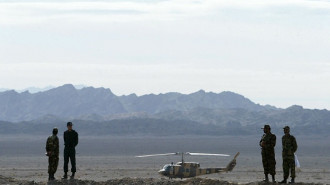Trump seeking Arab force to replace US Syria presence: report
US officials have reportedly reached out to Saudi Arabia, Qatar, the UAE and Egypt about providing funds and military resources to create the force. The Trump administration's goal is to block the Islamic State group from re-establishing itself in Syria at the same time as it seeks to minimize the US role in the country.
WSJ reported the plan has also attracted the attention of Erik Prince, founder of private military contractor Blackwater, which helped the UAE and Somalia establish private security forces.
The WSJ report comes days after Trump ordered more than 100 missile strikes on three chemical weapons facilities in Homs, Syria. The UK and France joined the US in the strikes after a suspected regime chemical attack left dozens dead last Saturday in Eastern Ghouta, a formerly rebel-held enclave that the regime recently recaptured after a fierce air and ground campaign began on February 18.
Prior to Saturday's missile strikes, Trump had expressed reluctance about a long-term US presence in Syria. On multiple occasions, including Friday, he said he'd like to bring American troops home.
"America does not seek an indefinite presence in Syria," he said during the address announcing Saturday's strikes. "It’s a troubled place. We will try to make it better. But it's a troubled place."
Twitter Post
|
The recent chemical attacks appear to pull at two of Trump's conflicting impulses - using military power to hold the Syrian regime to account and extricating the US from its foreign entanglements.
On Friday night, Trump hinted at his administration's efforts to have Arab states take up a larger role as he grows impatient with the Syrian war. "We have asked our partners to take greater responsibility for securing their home region, including contributing larger amounts of money," he said.
US officials have walked back Trump's comments, warning that pulling US troops out of Syria could have a destabilising effect in the region.
They have argued that the 2,000 US forces scattered around small military bases in northern Syria check Russian behaviour and Iranian influence in the country.
Trump's response to chemical weapons use in Douma last Saturday follows a similar reaction to an April 2017 chemical attack in Khan Sheikhoun. Within three days of that attack, which the UN-OPCW Joint Investigative Mechanism later attributed to the Syrian regime, Trump ordered Tomahawk missiles on the airfield where the attacks were launched.
Trump has previously suggested that the US could extend its military presence in Syria if other states foot the bill. The report is consistent with Trump's "America First" worldview and transactional view of foreign affairs.

![Palestinians mourned the victims of an Israeli strike on Deir al-Balah [Getty]](/sites/default/files/styles/image_684x385/public/2024-11/GettyImages-2182362043.jpg?h=199d8c1f&itok=xSHZFbmc)


![The law could be enforced against teachers without prior notice [Getty]](/sites/default/files/styles/image_684x385/public/2178740715.jpeg?h=a5f2f23a&itok=hnqrCS4x)
 Follow the Middle East's top stories in English at The New Arab on Google News
Follow the Middle East's top stories in English at The New Arab on Google News
![Fakhrizadeh [AFP] Fakhrizadeh [AFP]](/sites/default/files/styles/image_330x185/public/media/images/774C39F7-8F7A-4D67-B998-27D102FCB4A7.png?h=d1cb525d&itok=j9eGvunV)

